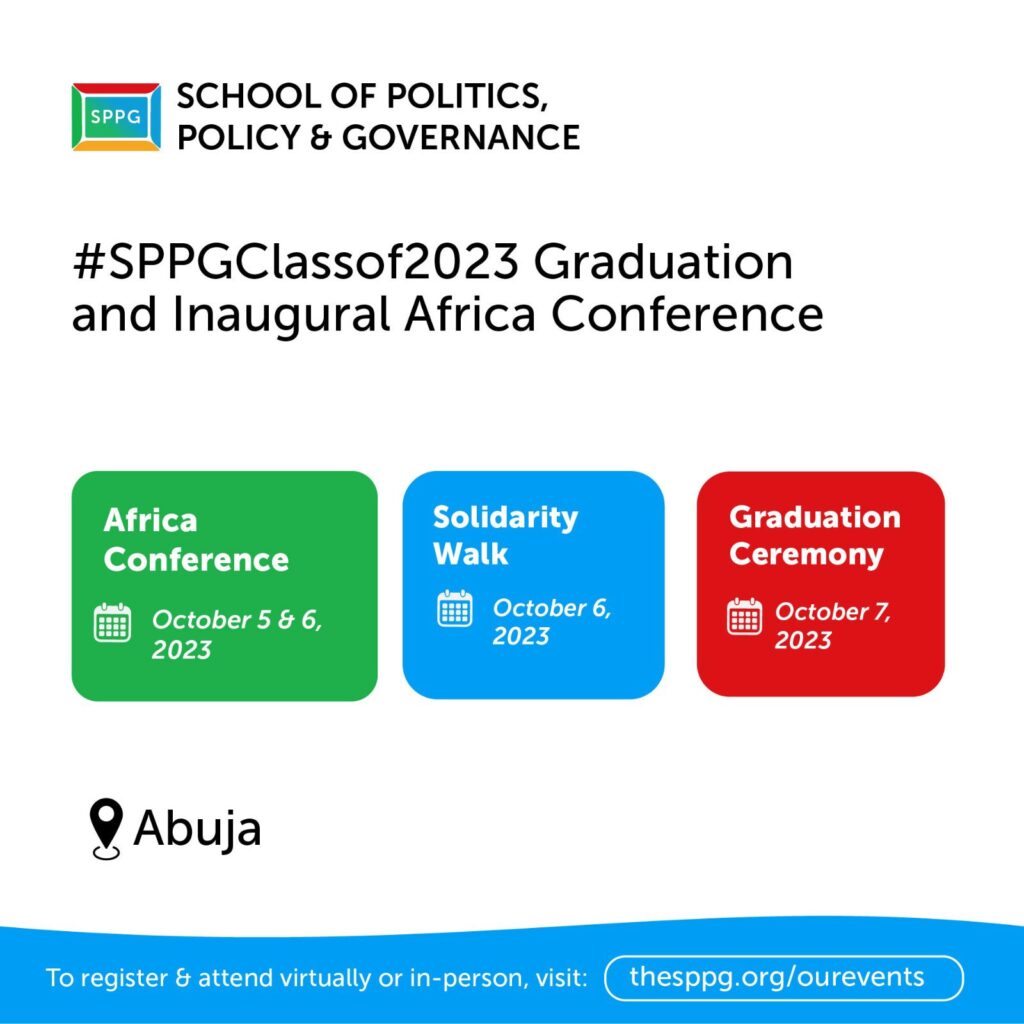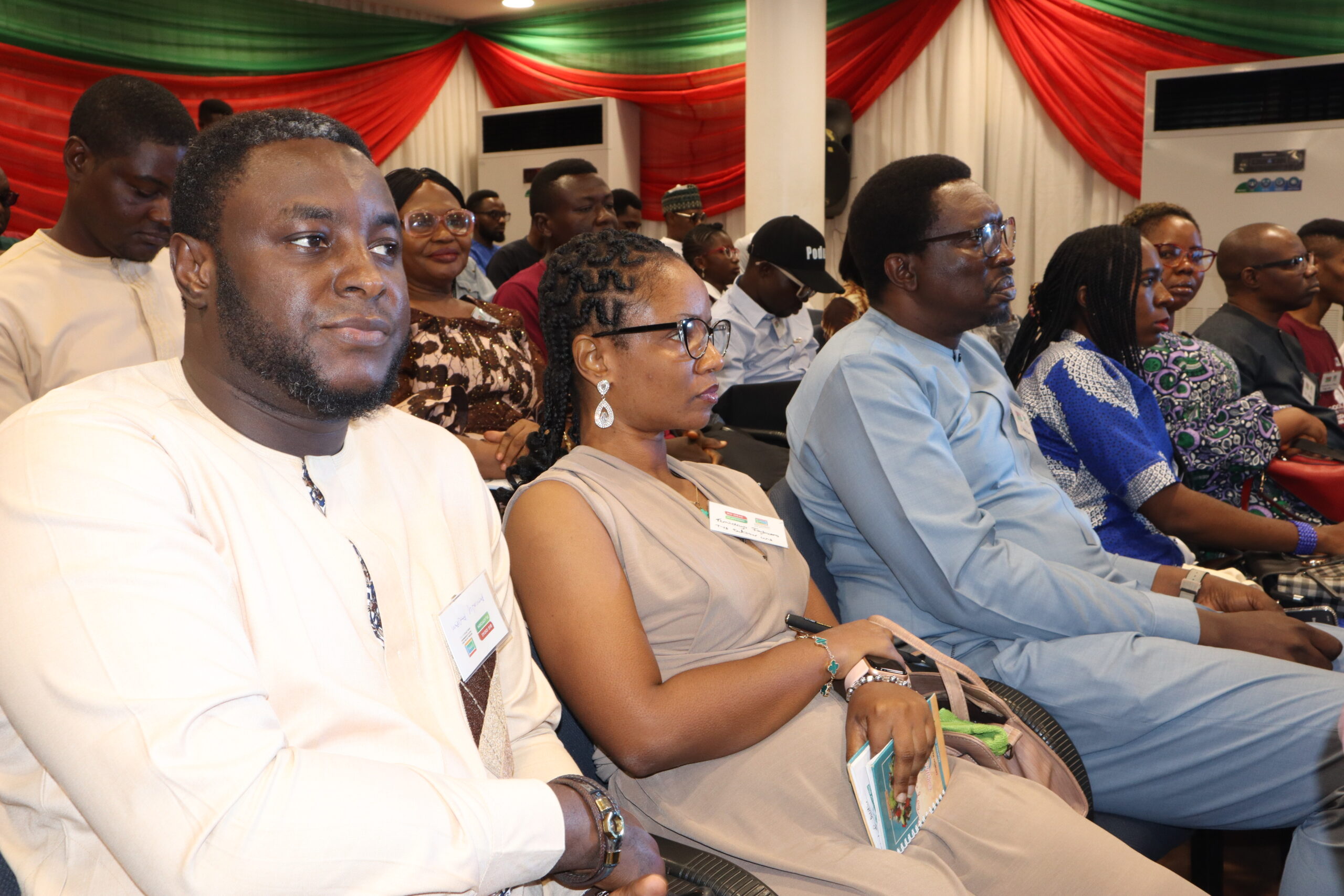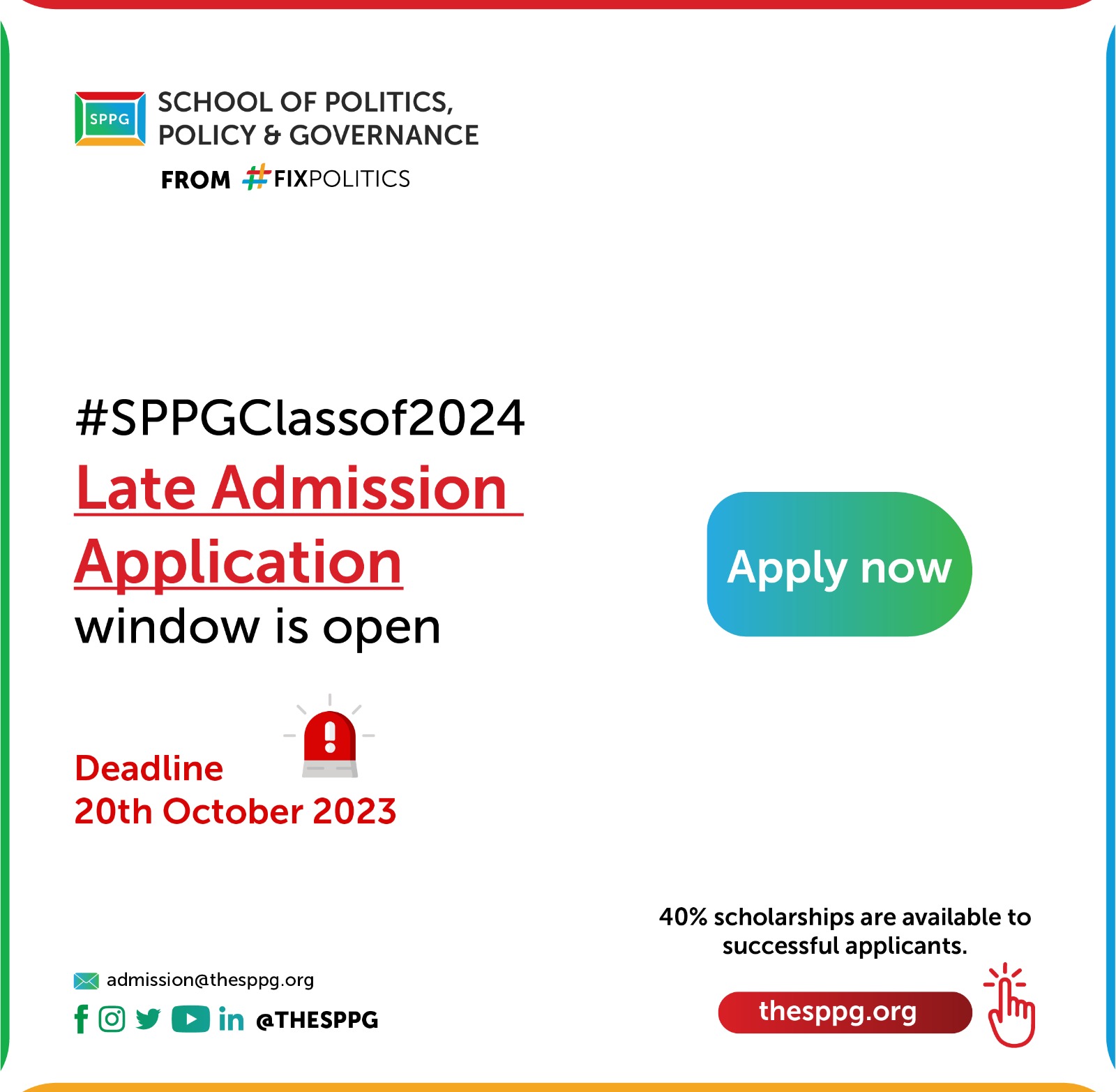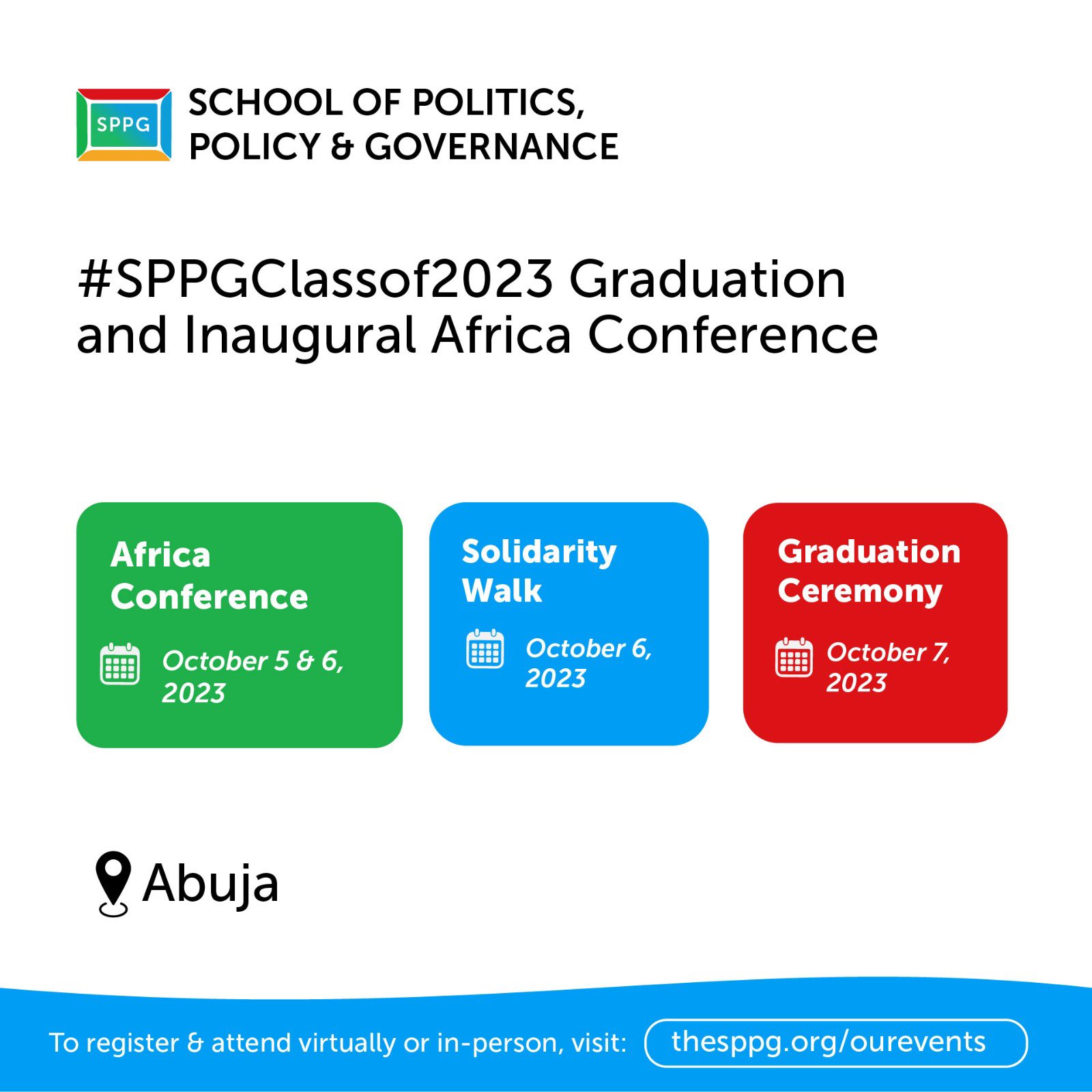SPPG Launches #JoinPolitics Campaign to Inspire Nigeria’s Professionals to Lead
Admissions Open for the Class of 2026 – Apply Now
Abuja, Nigeria - The School of Politics, Policy, and Governance (SPPG) is an unconventional school designed to attract, develop and produce a new generation of political leaders who will listen and serve the new class of citizens who know their rights.
In line with this mission, the school has officially launched the #JoinPolitics campaign, a bold initiative urging technocrats, professionals, and values-driven leaders to step into the political arena and drive meaningful governance reform in Nigeria. With applications now open for the SPPG Class of 2026, this campaign calls on the nation’s best and brightest to replace the compromised ruling class and restore integrity to governance.
A world-class academic education initiative, the SPPG is designed as a 21st century Disruptive Thinking Leadership program to train 10000 new political leaders in five years who will run for elective offices at State and Federal levels in legislative and executive offices, thus presenting the electorate with top quality choices of candidates. These leaders will form the massive base and pipeline of a new and Disruptive thinking political class, known for their Values-Driven Character, Unquestionable Competence and Undeniable Capacity.
The Urgent Call to Action: Why #JoinPolitics Matters
Dr. Obiageli “Oby” Ezekwesili, Founder & Chair of SPPG, highlighted the root cause of Nigeria’s leadership failure and why professionals must step up to fix it:
“Poor governance is the direct outcome of a leadership pipeline that has prioritised personal ambition over public service. A nation cannot thrive when those in power lack the character to lead with integrity, the competence to make informed, evidence-based decisions, and the capacity to drive meaningful change. If we do not intentionally develop a new class of leaders anchored in these values, Nigeria will continue to suffer the consequences of poor governance.”
The SPPG is that pipeline equipping leaders with the right knowledge, network, and values. We are committed to ensuring that Nigeria’s governance system is led by competent, ethical, and accountable individuals.
Speaking on the campaign, Alero Ayida-Otobo, CEO of SPPG, emphasised the critical role professionals and technocrats must play in fixing Nigeria’s leadership crisis:
“For decades, Nigeria’s governance structures have been hijacked by individuals who lack the character, competence, and capacity to lead. Meanwhile, our country boasts some of the most brilliant professionals - doctors, engineers, economists, entrepreneurs - who have excelled globally but remain absent from politics.
It is time for these technocrats to wake up, step forward, and lead. Your expertise is needed in governance, not just in boardrooms or the private sector. If the best of us refuse to engage, the worst of us will continue to rule. The time to act is now.”
At its core, SPPG exists to bridge Nigeria’s leadership gap by developing ethical, capable, and transformative leaders who will drive systemic change.
Dr. Abiola Akiyode-Afolabi, Dean of SPPG Nigeria, reinforced this mission:
“Through our unconventional curriculum, we instill integrity, empathy, and accountability, ensuring that our graduates make ethical decisions in leadership. With intensive academic training and hands-on learning from our stellar faculty, we equip our students with the expertise and skills to navigate Nigeria’s complex political and governance landscape.”
The SPPG Class of 2026 offers a rigorous, unconventional 10-month curriculum designed to prepare professionals for leadership in governance. Taught by world-class faculty and enriched by a strong Network of SPPG Public Leaders, the programme provides practical skills, real-world political strategies, and access to a supportive ecosystem of like-minded changemakers.
Who Should Apply?
SPPG invites visionary professionals who are ready to transition into political leadership. Ideal candidates include:
- Technocrats and Industry Leaders – Engineers, economists, lawyers, doctors, and business executives ready to apply their expertise to governance.
- Public Service Enthusiasts – Individuals eager to drive policy reforms, shape governance, and champion democratic accountability.
- Aspiring Political Leaders – Those interested in running for office or securing key positions in governance to restore national trust and effective leadership.
Application Details and Deadline
- Apply Now: Visit https://nigeria.thesppg.org/apply
- Deadline: August 31, 2025
- Scholarships: 40 to 100 percent (terms and conditions apply)
What You Need to Apply
- Academic qualification (B.Sc, BA, or HND)
- Master’s or postgraduate certificate (if applicable)
- Personal Statement (Maximum 750 words)
- Curriculum Vitae (Maximum 2 pages)
- Two referees who must have known the applicant for at least 12 months
- Short Bio (Maximum 300 words)
About SPPG
The School of Politics, Policy, and Governance (SPPG) is an unconventional school designed to attract, develop and produce a new generation of political leaders who will listen and serve the new class of citizens who know their rights. Founded in 2020, SPPG has already graduated four cohorts of competent leaders, many of whom are actively shaping the country’s political and governance landscape.
For media inquiries, interviews, or further information, please contact:
- Email: info@thesppg.org
- Website: https://nigeria.thesppg.org
- Follow the conversation online: #JoinPolitics | #TheSPPGAdvantage
Big Ideas Platform 2024: Recap of the Bold Ideas for Africa's Renaissance
[Abuja – May 25, 2024] – The School of Politics, Policy, and Governance (SPPG), in partnership with the Yar’Adua Foundation and MacArthur Foundation, hosted the Big Ideas Platform 2024 on Saturday, May 25, at the Shehu Musa Yar’Adua Centre in Abuja. The event, themed ‘Information Technology and Behavior Change’ centred on leveraging technology and socio-behavioural programming as ‘game changers’ for Africa's transformation.
The event kicked off with an opening remark by the CEO of SPPG, Alero Ayida-Otobo “Technology is truly a game changer, playing a pivotal role in addressing significant developmental challenges across sectors in Africa: Communication, Commerce, Medicine, Education, Security, Food Production, and so much more." The platform spotlighted four subthemes - blockchain technology, environmental awareness, virtual reality, and artificial intelligence (AI) - and had four of Africa’s bright minds share their big ideas.
Four Big Ideas Curators
Oluseun Badejo, project implementation specialist and team lead of the SPPG Blockchain Project shared his big idea on deploying blockchain technology deployment in the educational sector to address critical issues like certificate forgery, data alteration, and ensure that academic records are secure, accessible, authentic, and verifiable by employers and academic institutions without the hassle of running back to your alma mater each time your academic records are requested, scratch the traditional filing of academic records which takes time to find and has resulted to people losing academic and professional opportunities. This technology could be revolutionary in addressing the rampant issue of fake transcripts in Nigeria and across Africa. This will offer a secure and cost-effective solution for verifying academic credentials.
Speaking in a session on waste management tools, Sian Cuffy Young, an award-winning waste management consultant, educator and social entrepreneur, and founder of Siel (Sigh-el) Environmental, a highly successful social enterprise that revolutionises waste perception and practices for individuals and businesses, shared her big idea on how to create environmental awareness in children, educate them so they can make informed environmental choices. She emphasised that effective environmental change begins with an individual commitment to sanitise our environment as a personal responsibility. Her big idea cites the ‘innovative use of educational books and animations targeted at younger generations to underscore the need for teaching practical waste management skills early’. This focus on proactive methods over interventionist awareness campaigns will drive lasting environmental change.
Sabiqah Bello, representing Ahmad Salkida, the CEO of HumanAngle, a niche media platform using virtual reality to humanise Africa’s conflict, humanitarian, and development issues to evoke empathy, talked about their groundbreaking exploration of virtual reality (VR) in journalism. Offering a glimpse into the future of digital storytelling, the session illustrated VR's ability to immerse viewers in the lived experiences of others, enhancing empathy and understanding. For journalists, VR technology represents a powerful tool for conveying emotional and impactful narratives, potentially transforming the framing and dissemination of news stories.
Toyosi Akerele-Ogunsiji, Technology Education Professional, and Founder of Rise Networks and Passnonwnow, shared her big idea highlighting the critical role of artificial intelligence (AI) for information verification in today’s data-heavy world. Akerele emphasised AI's capacity to identify false reports, a key factor in combating misinformation. She also stressed the importance of integrating AI courses into educational curricula to prepare Africa’s growing population of AI users. By investing in AI, Africa can enhance its global competitiveness, ensuring that students and professionals are equipped with the necessary skills to utilise AI effectively.
Here's a critical commentary by Toyosi Akerele-Ogunsiji on AI
The VillageSquare Conversation
But beyond these big ideas, there was a question of how to scale them to transform Africa and build a better future. Dr Amina Salihu, the Deputy Director Africa Office of the MacArthur Foundation, pioneer Dean of SPPG and the lead of SPPG’s thought-leadership, led this conversation during The VillageSquare Conversation. Ajibola Amzat, a Nigerian investigative journalist, pointed out that technology can be useful but can be used as a weapon the other way round. Prof Remi Sonaiya, Nigerian politician and educationalist, and one-time presidential candidate, cited that the real challenges we face involve the ethical use of technology. She warned that technology, like a knife, can be a tool for good or harm and that the focus should be on the ethical dimension, character, competence, and capacity. However, Frank Nweke Jnr, a Nigerian Politician, Entrepreneur, Teacher and Social Innovator, and two-time Federal Minister cautioned that Africa is not represented in discussions on the global agenda regarding artificial intelligence. He added that the world will continue to have needs, and those with artificial intelligence expertise will be crucial in meeting them. On the other hand, Dr Obiageli ‘Oby’ Ezekwesili, Founder and Chair of the #FixPolitics, shared her concerns that it is the rate of the dearth of ideas that distinguishes one country from the other, one continent from the other, and reaffirmed SPPG’s determination to ensure that these big ideas will give resultant transformation in our continent.
The 2024 Big Ideas Platform proved to be an enlightening experience that offered attendees and uptakers a wealth of knowledge on the transformative potential of technology in addressing some of the continent's most pressing issues.
As the event concluded, it was clear that the big ideas, insights, and innovations presented hold significant promise for driving positive change in Africa. The 2024 Big Ideas Platform successfully highlighted the critical intersection of technology and development, leaving attendees eager to take action for social impact across Nigeria and the broader African continent.
Join us, let's co-create the Africa we need.
About the Big Ideas Platform: The Big Ideas Platform is a thought leadership initiative developed by the School of Politics, Policy, and Governance. With a focus on empowering African innovators and amplifying their voices, this platform aims to promote dialogue, collaboration, and action to address the pressing challenges faced by African communities. By highlighting transformative ideas, the Big Ideas Platform strives to facilitate inclusive growth, development, and the realization of the African Renaissance.
The late-admission application window into the #SPPGClassof2024 is open and closes on October 20 2023
The late-admission application window into the #SPPGClassof2024 is open and closes on October 20 2023
The SPPG, School of Politics, Policy and Governance, established in 2020, is building a pipeline of a new and disruptive-thinking political class with a mission to transform the quality of political and public leadership in Nigeria and the rest of Africa. The School is a unique Public Leadership Preparation initiative.
The SPPG educates present and future leaders that are committed to public good and who are ready to serve as stewards of the well-being of all Nigerians. The School delivers an unconventional multidisciplinary curriculum that is aimed at producing a massive base of ethical, competent and capable public leadership with the requisite knowledge and skills to solve complex development problems in our country and continent.
So far, SPPG has graduated 3 cohorts of students as #PioneerClassof2021 (160), #Classof2022 (133) and #Classof2023 (184). Consistent with the mission of TheSPPG.org, upon graduation, many of our students run for elective offices across various parties while others pursue leadership careers in the public and private sectors as well as civil society.
In furtherance of our mission and commitment to attracting exceptional talents and students, , we have decided to open a Late Admission Window for those who wish to apply to the #Classof2024. The deadline for applications using the Late Application Window is extremely tight and ends on October 20, 2023. Admission to the SPPG is highly competitive through a rigorous selection process conducted entirely virtually.
To apply, visit thesppg.org .
Who can apply?
- All applicants must have a minimum educational qualification of a B.Sc or HND/BA.
- Applicants must be able to demonstrate commitment to public leadership.
- The ability to demonstrate the successful execution of projects will be an advantage.
- What you need to apply
- Applicants are required to upload the following to the online application portal:
- Academic qualification (BA, B.Sc or HND).
- Master or any other Post Graduate Certificate (if applicable).
- Personal Statement (Maximum – 750 words).
- Curriculum Vitae (Maximum – 2 pages).
- Details of 2 recommenders (peer, community leader or employer who must have known you for a minimum of 6 months and can vouch for your character and suitability for this program).
Application Deadline
To fast-track the admissions process, applicants are expected to fulfil all admission requirements on or before October 20 2023.
Limited scholarship slots are available. Terms and conditions apply.
Incomplete applications (applications without recommendation letters) will be disqualified.
To learn more about the School of Politics, Policy and Governance, visit thesppg.org.
Join us for the phenomenal #SPPGClassof2023 Graduation Week
We are thrilled to invite you to join us at the School of Politics, Policy, and Governance Graduation Ceremony and Africa Conference 2023.
After a rigorous but rewarding transformative journey of 10 months, the #SPPGClassof2023 has experienced a remarkable journey of growth, invaluable knowledge exchange from our global faculty, capstone mentors, and peers, as well as outstanding accomplishments, which is why we are pleased to celebrate their steadfast dedication to transformative political and public leadership.
This year, the inaugural edition of the Africa Conference 2023 debuts as part of the graduation ceremony for #SPPGClassof2023. It promises to be a historic gathering that assembles African value-oriented governance and citizen movements to connect, learn from each other, and build a lasting network of disruptive leaders in the public space, ready to shape and influence the future of governance in their respective countries and throughout the continent.
We are excited to bring the line-up of activities marking the #SPPGClassOf2023 Graduation Event to your notice. It promises to be a remarkable experience. One you wouldn’t want to miss.
Kindly find the details below:

1. The Africa Conference:
https://www.youtube.com/watch?v=4Fk9QIgK2Fs
The Africa Conference will bring together disruptive political and community leaders, SPPG students and alumni, and the #FixPolitics WSG Community. We will explore the significance of citizen-led movements, their impact on African governance, and their crucial role in the continent's renaissance.
Day 1: The first day of the event will focus on the theme "Governance and Political Trends in Africa: An Overview of Citizen’s Movement and their impact
Date: October 5th, 2023
Time: 10:00 am -5:00 pm WAT
Venue: Shehu Yar’Adua Center, Abuja
Day 2: The conference continues with feedback sessions, where participants will share the outcomes of their discussions from the previous day and work towards actionable solutions.
Date: October 6th, 2023
Time: 12:00 pm- 3:30 pm WAT
Venue: Shehu Yar’Adua Center, Abuja
2. Graduation Ceremony:
https://www.youtube.com/watch?v=keO_ACb0jeU
The events will culminate in the graduation ceremony recognizing the achievements of the #SPPGClassof2023 and celebrating their journey towards becoming values-driven, disruptive leaders.
Date: October 7th, 2023
Time: 10:00 am -3:00 pm WAT
Venue: Idris .A. Abdulkadir Auditorium, National Universities Commission, 26 Aguiyi Ironsi, Maitama, Abuja.
Please RSVP for each event you plan to attend via the registration link below:
Attendance is free, but registration is compulsory.
Click here to RSVP for both events.
Fuel Subsidy and the Real Economy - Precious Chimdimma Ebere Class of 2022
Opinion piece by Precious Chimdimma Ebere Class of 2022
As one who read Social and Public Policy at my Master's level and has been privy to contributing to developing policies at both local and international levels, I have seen the implications of how a badly executed policy has tremendously affected the polity of the economy.
Having carried out a previous study on the implications of fuel subsidy on the economy, social welfare, and overall development of Nigeria, to share my findings let us first delve deep into understanding what Fuel Subsidy is. Fuel subsidy refers to the government's practice of artificially lowering the price of petroleum products, particularly gasoline, through financial interventions. While it may seem like a beneficial policy, especially for consumers who enjoy lower fuel prices, the long-term consequences of fuel subsidy can be detrimental to the country's progress.
As a public policy expert who understands both lenses (mass agitation vs government policy), it is imperative that the government maintain a balance when implementing changes or removing policies. When a particular policy, such as fuel subsidy, is removed, it is crucial to have measures in place to mitigate any potential negative consequences and ensure a smooth transition. The goal is to avoid disruptions that could lead to social unrest or economic instability, thereby safeguarding national peace.
The practice of artificially lowering the price of petroleum products through financial interventions has been a longstanding policy in Nigeria. While it may initially appear beneficial by providing affordable fuel to consumers, the long-term consequences of fuel subsidy pose significant dangers to the country's development and growth. This article will explore the implications of fuel subsidy on Nigeria's economy, social welfare, and overall progress. It highlights the drain on the national budget, fostering inefficiency in the energy sector, contributing to corruption, and hindering market dynamics and innovation. It also emphasizes the need for a balanced approach in policy implementation and offers insights into the UK's experience with policy transitions.
The Drain on the National Budget:
One of the major dangers of fuel subsidies is their significant drain on the national budget. For example, let’s say, the intention of the government to subsidize petrol was simply to make the product affordable for Nigerians and make life easier. So, the average price of petrol in the world can be as high as N590, however, the Nigerian Government will subsidize the product and fix the price at N185 bringing the total amount of subsidy per liter to N405.
According to data released by NNPC in 2022, the average consumption of liters of petrol in Nigeria per day is 60 million liters. Even though The controversy surrounding the actual daily petrol consumption in Nigeria has been unending with the different agencies in charge of the importation and distribution of Premium Motor Spirits reeling out conflicting figures. The daily petrol consumption in Nigeria remains a mystery. However, If the average consumption of petrol in Nigeria per day is indeed 60 million liters, it would indicate a significant demand for petrol in the country. Nigeria is one of the largest oil-producing countries in Africa, and petroleum products, including petrol, play a crucial role in the country's energy and transportation sectors.
However, Marketers of the product load as much as 100 million liters and above per day.
This means the Nigerian Government is expected to pay as much as N405 × 100,000,000 (liters) as subsidy per day to the Marketers of the product to keep prices at N185 for instance. This brings the amounts to N40.5 billion daily and about N1.2 trillion monthly. Kindly take note that this amount can either decrease or increase following the prices of petrol at the international market.
So, just try to wrap your head around it and know what Nigeria expends on fuel subsidy alone in a year - obviously some billions of dollars.
From the government's end; subsidizing fuel requires a substantial amount of public funds that could otherwise be allocated to critical sectors such as education, healthcare, infrastructure, and social welfare programs. This limits the government's ability to invest in these areas, hindering overall development and growth. One may beg to ask, how judiciously have people in authority utilized the national budget to advance the economy?
To determine the actual daily petrol consumption; the NNPC, which is currently responsible for importing 100 percent of petrol into the country, needs to submit its accounts for forensic auditing as advised by experts.
Fostering Inefficiency in the Energy Sector:
Analyzing from the lens of the Energy Sector, Fuel subsidy fosters inefficiency in the sector by discouraging private investment. When the government artificially lowers fuel prices, it reduces the incentive for private sector participation in the petroleum industry. This lack of investment hampers the development of domestic refining capabilities, leading to heavy reliance on imported petroleum products. Consequently, Nigeria becomes dependent on foreign sources for its energy needs, negatively impacting national sovereignty and economic stability.
Contribution to Corruption and Rent-Seeking Behaviors:
Looking at the various caveats explored above, it is evident that fuel subsidy also contributes to widespread corruption and rent-seeking behaviors. The opaque nature of subsidy disbursement and the large sums of money involved create opportunities for corrupt practices. Some individuals exploit the system to divert funds meant for fuel subsidy, leading to a significant loss of public resources. These corrupt practices perpetuate inequality and hinder socioeconomic development.
Distortion of Market Dynamics and Inhibition of Innovation:
Market analysts and Climate change activists will argue that fuel subsidy distorts market dynamics and discourages innovation in the energy sector. When prices are artificially low, there is little incentive for consumers to adopt energy-efficient technologies or explore alternative sources of energy. This inhibits the transition to cleaner and more sustainable energy solutions, which are crucial for addressing climate change and reducing environmental pollution.
In contrast, if fuel subsidies are phased out or removed, it creates a more level playing field for different energy sources. The true cost of fossil fuels, including their environmental and social impacts, is reflected in the market price. This can incentivize consumers and businesses to seek out cleaner energy options and invest in innovative technologies that reduce dependence on fossil fuels.
For instance, higher fuel prices can stimulate demand for electric vehicles (EVs) and encourage the development of charging infrastructure. With the removal of fuel subsidies, consumers may be more motivated to consider EVs as a viable alternative, leading to increased adoption and market growth. This, in turn, spurs innovation in the EV industry, with companies investing in research and development to improve battery technology, extend driving range, and reduce costs in a more sustainable way. This indeed could usher us into the future of energy sustainability.
A Balanced Approach to Policy Implementation:
Having analyzed the pros and cons of fuel subsidy, in the realm of public policy, it is imperative to maintain a balance when implementing changes or removing policies. When a particular policy, such as fuel subsidy, is removed, it is crucial to have measures in place to mitigate any potential negative consequences and ensure a smooth transition. The goal is to avoid disruptions that could lead to social unrest or economic instability, thereby safeguarding national peace.
To articulate this concept better, let's consider the example of strategically removing fuel subsidy. Instead of abruptly ending the subsidy, a comprehensive approach should be adopted. This approach involves researching and implementing alternative policies and measures that cater to a balance between the needs of the people and the larger economic objectives.
For instance, when removing fuel subsidy, the government can introduce targeted social safety net programs to protect vulnerable populations from sudden price shocks. These programs can provide direct cash transfers, subsidies on essential goods and services especially on transportation, or support for income-generating activities. By implementing such measures, the government ensures that the removal of the subsidy does not disproportionately burden those already facing economic hardships, thereby maintaining social cohesion.
While safety net programs require government expenditure, their impact on the national budget can be managed through careful budgetary planning and fiscal discipline. Governments can implement measures such as means-testing, periodic reassessments, and cost controls to ensure that the programs are effectively reaching the intended beneficiaries while minimizing waste and preventing excessive strain on public finances. Also, these safety net programs can provide an economic multiplier effect. By providing support to vulnerable individuals or households, these programs can help maintain a certain level of consumer spending, which, in turn, can stimulate demand and contribute to economic activity. This can have indirect benefits for businesses and employment, leading to overall economic stability and growth.
Additionally, when removing a policy like fuel subsidy, the government should simultaneously work towards creating an enabling environment for private sector participation and investment. This can be achieved by implementing supportive policies, such as improving the ease of doing business, providing incentives for domestic refining and alternative energy sources, and promoting competition in the energy sector. These measures stimulate economic growth, foster innovation, and create employment opportunities, thereby mitigating any potential negative impacts on the economy.
Furthermore, effective communication and transparency are vital during policy transitions. The government should engage with stakeholders, including civil society organizations, experts, and affected communities, to ensure their concerns are heard and addressed. Transparent reporting on the utilization of public funds and regular audits can help build trust and hold those in authority accountable for their actions, reducing the likelihood of corruption and mismanagement.
Lessons from the UK's Experience with Policy Transitions: Universal Credit
While doing a case study on Universal Credit a welfare benefit system introduced in the United Kingdom, designed to simplify the process of receiving various social security benefits into a single monthly payment. It replaces six existing benefits, including housing benefits and income support, and aims to provide a more streamlined and responsive support system for individuals and families. I picked up a few strategic lessons. The UK government's implementation of Universal Credit provides valuable lessons on policy transitions and the importance of considering social and economic balance. Comprehensive planning, gradual implementation, and mitigating potential negative impacts were key aspects of the Universal Credit reform. The government actively engaged with stakeholders supported employment opportunities, and implemented monitoring and evaluation processes to ensure the policy's success. Even though there were a few lapses in the proper execution, it was commendable by the larger populace. Incorporating these lessons into policy-making processes can enhance the likelihood of achieving desired objectives while maintaining social and economic balance.
Recommendation for the Nigeria Government
In order to ensure a comprehensive and balanced approach to the fuel subsidy removal policy and its impact on the Nigerian population, the government should consider the following recommendations:
- Conduct a thorough and inclusive analysis: The government should undertake a comprehensive analysis of the fuel subsidy removal policy, taking into account the perspectives and concerns of various stakeholders, including citizens, businesses, and experts. This analysis should assess the short-term and long-term effects of the policy on the livelihoods of Nigerians and the overall economy.
- Consider the welfare of the average Nigerian: When determining fuel prices, the government should consider the minimum wage and the standard of living of the average Nigerian. This will help ensure that the cost of fuel remains affordable and does not disproportionately burden the most vulnerable segments of society.
- Implement measures to mitigate the adverse effects: Recognizing that the removal of fuel subsidies may have negative consequences, especially for low-income individuals and households, the government should implement targeted measures to mitigate these effects. This could include implementing social safety nets, such as direct cash transfers or subsidies for essential goods and services, to cushion the impact on vulnerable populations.
- Explore alternative solutions: Instead of relying solely on fuel subsidy removal, the government should explore alternative solutions to address the challenges in the energy sector. This could involve promoting renewable energy sources, improving energy efficiency, and diversifying the energy mix. By investing in sustainable and clean energy solutions, the government can reduce dependence on fossil fuels and create a more resilient and environmentally friendly energy system.
- Prioritize citizen welfare: Above all, the government should prioritize the welfare and well-being of the Nigerian people. This means actively listening to their concerns, engaging in open dialogue, and incorporating their feedback into policy decisions. By adopting a citizen-centric approach, the government can ensure that its actions align with the needs and aspirations of the Nigerian population.
In conclusion, the politics behind fuel subsidy in Nigeria, while often perceived as a means of providing short-term relief to citizens, pose significant dangers to the country's development and growth. When removing a policy, measures should be put in place to mitigate potential negative consequences and maintain social harmony. To achieve sustainable development and foster economic growth, a balanced approach to policy implementation is essential, including targeted social safety net programs, fostering private sector participation, promoting transparency, and engaging with stakeholders. Certainly, accountability and judicious utilization of the national budget by people in authority play a crucial role in advancing the economy and ensuring overall development. While it is true that some individuals in positions of power have misused public funds, it is essential to recognize that effective public policies and good governance can address these challenges and foster positive outcomes. By adopting such a comprehensive approach, policymakers can navigate policy transitions effectively, avoiding distortions of national peace and fostering sustainable development.

Precious Chimdimma Ebere Class of 2022
Social media Handles
Facebook: https://www.facebook.com/preciouseberegem
Twitter: https://twitter.com/preciousebere
Instagram: https://www.instagram.com/preciousebere_gem/
LinkedIn: https://www.linkedin.com/in/precious-ebere-4452b2132





